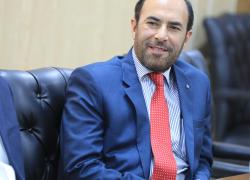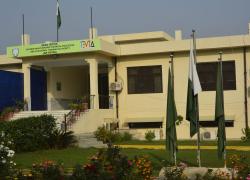Revolutionizing Dental Education in Pakistan: UHS Introduces a New Modular Integrated Curriculum for BDS Program
The University of Health Sciences (UHS) has taken a significant step forward in dental education by introducing a new modular integrated curriculum for the Bachelor of Dental Surgery (BDS) program. This innovative approach is designed to modernize dental education, making it more flexible, integrated, aligned with current healthcare needs and globally accepted.
This blog is aimed to briefly discuss key features, overall structure, modules, benefits for students and faculty and implementation challenges of this groundbreaking curriculum.
Key Features of the New Modular Curriculum
1.Flexibility and customization
One of the most notable features of the new curriculum is its flexibility. Unlike traditional curricula that follow a fixed sequence of courses, the modular framework allows students to choose modules based on their interests and career goals. This means students can focus on areas they are passionate about, such as oral surgery, pediatric dentistry, or orthodontics, fostering deeper engagement and motivation.
2.Integrated learning
The new curriculum emphasizes integrated learning, which breaks down the barriers between different subjects. Instead of studying anatomy, physiology, and pathology separately, students learn these subjects within the context of dental health and disease. This approach helps students see how different disciplines are interconnected and how they apply to real-world dental practice.
3.Competency-based education
Moving away from traditional time-based education, the new curriculum adopts a competency-based model. Students progress through modules by demonstrating their competence in specific skills and knowledge areas, rather than simply completing a set number of hours. This ensures that graduates have the essential competencies required for effective dental practice, aligning their education with the demands of modern healthcare systems.
4.Emphasis on evidence-based practice
Incorporating the latest research and clinical guidelines, the modular curriculum places a strong emphasis on evidence-based practice. Students are trained to critically evaluate scientific literature, apply research findings to clinical decision-making, and stay updated with advancements in the field. This approach fosters a culture of lifelong learning, essential for keeping up with rapid developments in dental science.
Structure and modules
The modular curriculum at UHS is structured into three main types of modules: core modules, elective modules, and clinical practice modules.
a).Core modules
Core modules cover the fundamental knowledge and skills required for all dental professionals. These include subjects like dental anatomy, oral pathology, and clinical dentistry. Completing these modules provides students with a solid foundation in dental science, preparing them for more specialized areas of practice.
b).Elective modules
Elective modules offer students the opportunity to explore specific areas of interest in greater depth. Whether it's advanced endodontics, cosmetic dentistry, or community dental health, these modules allow students to tailor their education to their career goals. This flexibility is particularly beneficial in a diverse field like dentistry, where practitioners can pursue a wide range of specialties.
c).Clinical practice modules
Hands-on clinical experience is a cornerstone of dental education. The clinical practice modules in the new curriculum provide students with extensive practical training under the supervision of experienced faculty. These modules are designed to develop clinical competencies, including patient assessment, diagnosis, treatment planning, and the execution of dental procedures. By the time they graduate, students are well-prepared to handle real-world clinical scenarios with confidence and competence.
Benefits for students and faculty
1.Enhanced student engagement
The flexibility and focus on individual interests in the modular curriculum foster greater student engagement. When students have the autonomy to choose modules aligned with their passions, they are more likely to be motivated, enthusiastic, and committed to their studies. This increased engagement translates to better learning outcomes and a more fulfilling educational experience.
2.Faculty development
The shift to a modular curriculum also presents opportunities for faculty development. Educators are encouraged to innovate their teaching methods, incorporate technology, and engage in continuous professional development. This dynamic approach to teaching benefits both students and faculty, creating a stimulating academic environment.
3.Adaptability to change
The modular curriculum's structure allows for easier updates and revisions, ensuring that the education provided remains current and relevant. As new dental techniques, technologies, and research findings emerge, modules can be updated or new ones introduced without overhauling the entire curriculum. This adaptability is crucial in a rapidly evolving field like dentistry.
Implementation challenges
While the new modular curriculum offers numerous benefits, its implementation is not without challenges. Transitioning from a traditional to a modular system requires careful planning, resources, and faculty training. Ensuring consistency and quality across different modules is essential, as is maintaining a balance between core and elective content.
1.Resource allocation
Implementing a new curriculum involves significant investment in resources. This includes developing new course materials, training faculty, and upgrading facilities to support modern teaching methods. Securing the necessary funding and resources can be a challenge, especially for institutions operating with limited budgets.
2.Faculty training
Faculty members need to be trained to deliver the new curriculum effectively. This includes understanding the principles of integrated and competency-based education, as well as developing new teaching strategies that align with the modular framework. Providing ongoing professional development opportunities for faculty is essential to ensure the success of the new curriculum.
3.Students guidance
Students may require guidance in selecting modules that best align with their career goals and interests. Academic advisors and mentors play a critical role in helping students navigate the modular curriculum and make informed decisions about their educational pathways. Establishing a robust advising system is crucial to support students in making the most of the curriculum's flexibility.
Conclusion
The University of Health Sciences' new modular integrated curriculum for the BDS program represents a forward-thinking approach to dental education. By emphasizing flexibility, integrated learning, competency-based education, and evidence-based practice, UHS is preparing future dental professionals to excel in a dynamic and evolving healthcare landscape. This innovative curriculum not only benefits students by providing a more engaging and relevant education but also enhances the overall quality of dental care by producing competent, knowledgeable, and adaptable dentists. As other institutions look to modernize their curricula, UHS's modular framework stands as a model of excellence in dental education.


















